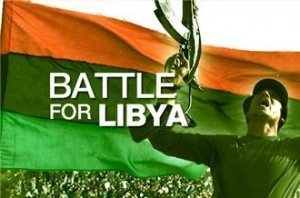
Khaled Kaim, Libya’s deputy foreign minister, has said that pro-government forces will withdraw from Misurata, leaving the tribes to deal with the rebels.
“The situation in Misurata will be dealt with by the tribes around Misurata and Misurata’s residents and not by the Libyan army,” Kaim told journalists late on Friday.
“We will leave the tribes around Misrata and Misrata’s people to deal with the situation, either using force or negotiation.”
Kaim’s announcement is a turning point for the besieged city, which has come under heavy fire from forces loyal to Libyan leader Muammar Gaddafi.
Fears of stalemate
It comes as John McCain, a US senator who is one of the strongest proponents in the US congress of American military intervention in Libya, said he was worried the battle between Gaddafi’s troops and rebel forces was reaching a stalemate that could “open the door to radical Islamic fundamentalism”.
McCain also denied during a visit to Benghazi concerns about the possibility of extremist or al-Qaeda elements fighting alongside the pro-democracy forces, telling Al Jazeera “they [opposition fighters] are my heroes”.
Admiral Mike Mullen, chairman of the US military’s joint chiefs of staff, offered a similar assessment.
“We’re watchful of it, mindful of it and I just haven’t seen much of it at all. In fact, I’ve seen no al-Qaeda representation there at all,” he said during a visit to the Iraqi capital Baghdad.
Mullen acknowledged that the Libyan Islamic Fighting Group, which waged a failed armed uprising against Gaddafi’s rule in the 1990s, had “stirred a little bit”.
He said air strikes had hobbled Libyan forces, but admitted the conflict was moving into “stalemate” as Gaddafi’s troops pressed on with their punishing siege in the western city of Misurata.
Need for transitional government
McCain called on Washington to recognise Libyan rebels’ transitional council as the true voice of the Libyan people and transfer frozen assets to them.
He also said that the NATO air campaign should be intensified, adding that Western allies should provide rebels with training, weapons and command-and-control activities to help overthrow Muammar Gaddafi, Libya’s longtime leader.
“I would encourage every nation, especially the United States, to recognise the transitional national council as the legitimate voice of the Libyan people,” McCain said, speaking to reporters in the eastern rebel stronghold of Benghazi on Friday.
“They have earned this right and Gaddafi has forfeited it by waging war on his own people.”
Al Jazeera’s Mike Hanna, reporting from Benghazi, says broader recognition “gives the transitional council a legal standing which it does not at the moment enjoy” along with “extra finance” and “greater political authenticity within Libya itself”.
“If the council is recognised as the authentic voice of the Libyan people, then they could receive those funds that have been frozen abroad from the Gaddafi regime,” he said.
McCain is the first from the United States to visit Benghazi since the conflict broke out in late February, made the trip to Libya on his own.
An aide said he met rebel leaders including finance chief Ali Tarhouni and armed forces head Abdel Fattah Younes.
The US senator’s arrival came close on the heels of the US president approving the use of armed drones in Libya against ground forces for the first time since America handed over the military operation to NATO.
‘No mission creep’
Predator drones have routinely been flying surveillance missions in Libya, Robert Gates, the US defence secretary, said at a Pentagon briefing on Thursday.
He said the US will provide up to two 24-hour combat air patrols each day by the unmanned Predators.
Gates rejected the notion that the approval of drone strikes means that the US will get pulled slowly back into a more active combat role, despite Barack Obama, US president, vowing to merely provide support for NATO.
Gates said that bringing in the Predators will give NATO a critical capability that the US uniquely can contribute.
“I think this is a very limited additional role on our part, but it does provide some additional capabilities to NATO,” Gates said.
“And if we can make a modest contribution with these armed Predators, we’ll do it. … I don’t think any of us see that as mission creep.”
The first armed drone mission since Obama’s go-ahead was flown on Thursday, but the aircraft, armed with Hellfire missiles, turned back due to poor weather conditions without firing any of its munitions.
Marine General James Cartwright, vice-chairman of the Joint Chiefs of Staff, said the drones can help counteract the pro-Gaddafi forces’ tactic of travelling in civilian vehicles that make it difficult to distinguish them from rebel forces.
“What they will bring that is unique to the conflict is their ability to get down lower, therefore to be able to get better visibility on targets that have started to dig themselves into defensive positions,” Cartwright said.
Gates, who publicly expressed scepticism about getting involved militarily in Libya before Obama endorsed the limited intervention, said “the real work” of overthrowing Gaddafi will have to be done by the Libyans themselves

Leave a Reply
You must be logged in to post a comment.